Siblings Without Rivalry
I am excited to have Simone from Jacaranda Tree Montessori guest post with us today with a follow up post to her How To Talk So Kids Will Listen and Listen So Kids Will Talk post on Confessions of a Montessori Mom blog. Siblings Without Rivalry is a wonderful resources for all parents with multiple children. Enjoy!
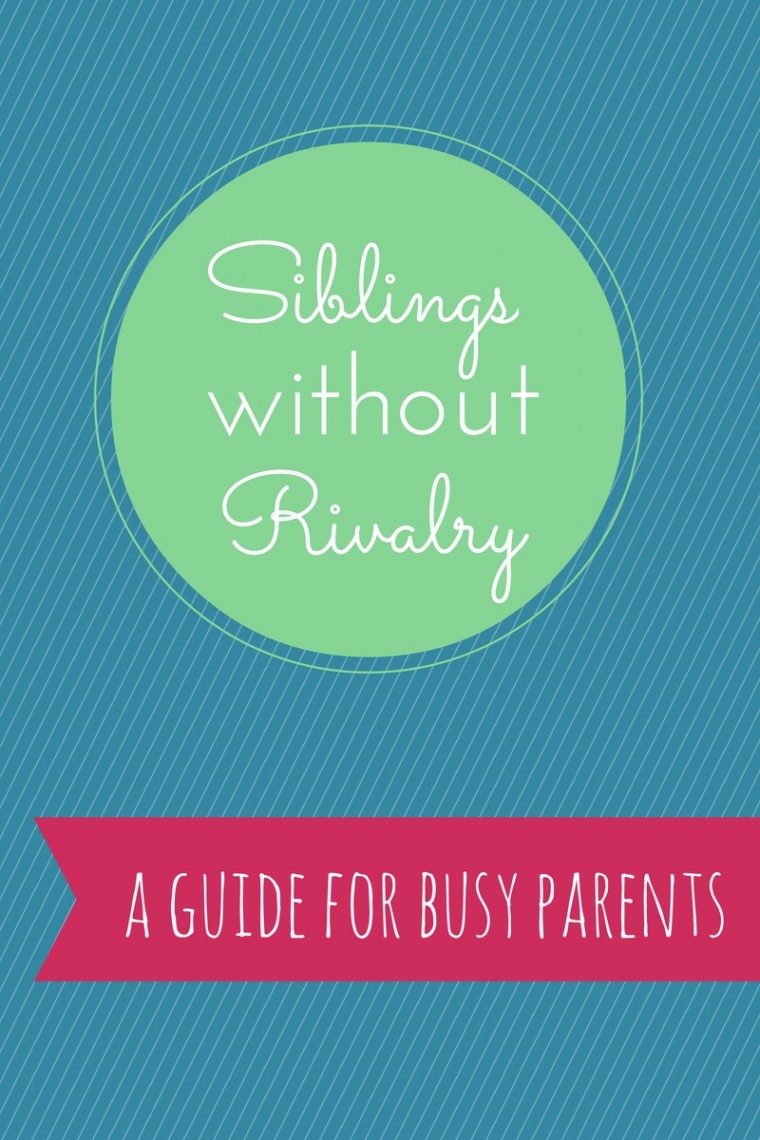
Thanks Marie for having me to guest post over here. It is so fun to meet you all “virtually” and share our passion for Montessori.
I have a confession. Growing up I was an absolutely terrible sister. As a kid I fought a lot with my sisters and as the youngest of three girls, I managed to escape without blame or punishment. I provoked my sisters and they tried to defend themselves. And who would get in trouble? The eldest.
She was meant to be responsible for us. And on top of that we also put ourselves into roles: the eldest was the loudest, the middle one the shy one, and as the youngest I got away with a lot more than the others as the baby of the family.
So you can imagine, when I found out I was expecting a second child, I was determined to do as much as I could as a parent for my children to get along. They didn’t have to be friends, but I was hoping that they would also be respectful of each other.
Having read and loved “How to Talk So Kids Will Listen and Listen So Kids Will Talk”, I discovered that Faber and Mazlich had also written a book about siblings. “Siblings without Rivalry” would become like a bible in the coming years. A book to be picked up every few years as things evolved.
How the book opens…
Not to ruin the book for you – because I really encourage you to read it – but the opening chapter resonated so much, I was hooked. Often we say to our older child/ren, we love you so so much that we have decided to have another baby. And then we are surprised when they are not absolutely delighted with the idea. They might even say that they hate the baby.
Instead the book opens with the analogy of your partner coming home and announcing that he/she loves you so much, they are going to get another partner too. And that they will use your old bed, your old toys, and your old clothes. For me, I’m sure I would react with nothing short of horror. The book enables you to be able to put yourself in your child’s shoes, and to see how they might view this new brother or sister in a more realistic way.
Overview
The authors give a super practical way to manage sibling rivalry. Each chapter has explanations, examples, summaries and clear comic strips to illustrate the principles. It makes it very digestible and I love that you are told not just what to avoid but, in a positive way, what you can do instead.
If there is one thing to take away from this book, it’s to let your children try to solve their problems themselves. As the parent, we can step back and – only if needed – act more as a mediator, acknowledging the difficulties of each child, and being a neutral party when problem solving is required.
Start from the pregnancy and birth of the sibling
It’s not too early to try out the suggestions in the book. Those of you with young children are probably thinking, well this is all fine if your kids are older. They are able to work these things out for themselves. But babies and toddler can’t, can they?
You would be surprised. Before my daughter was one, she crawled over and took a vehicle out of my then 2 year old sons’ hands. My son was furious. If not for reading this book, I would have explained that she was just a baby, he’s a big boy, and can’t he just let her play with it for a while – basically coming in to try to rescue the situation. Or try to find another vehicle. Or have them both in tears.
Instead I acknowledged, “One vehicle and two kids, that’s a real problem! You guys are good at solving problems. I’m curious to see what you come up with.” My son then detached the front cab part of the vehicle and gave it to his sister, and he kept the wheels. They had sorted it out in a much more creative way and for themselves.
The things I use every day from Siblings without Rivalry
- Acknowledging each child’s feelings
Instead of lecturing to the kids and stepping in to sort things out for them, my first reaction is to empathise which each of them. For example, (to my daughter), “So you are sad that your favourite pen is broken” and (to my son), “and you were so angry you just wanted to snap that pen in two!”
Instead of one child thinking I always take their side, or that they always get in trouble, their feelings are acknowledged and often they can then work things out themselves.
- Get kids to make amends
I wait until the tensions have lowered and, then, rather than punishing the child/ren who did something wrong, I encourage them to make amends to the other. Perhaps in the above example, they could give them one of their own pens, or try to repair the broken pen.
I find this works better than making them say sorry. Who hasn’t heard kids say sorry without showing any remorse and possibly even sounding snide.
Helping kids to make amends allows the child to take responsibility for themselves.
- Equal is not equal
Siblings can often complain, “that’s not fair!”, and we struggle to make things equal.
But at the same time I didn’t want to be counting out peas on my kids’ plates to make sure that everything was always equal. And how was I to show my love for my kids equally?
So it has really helped to apply the advice in the book to love your children uniquely. It’s much easier for me to tell my daughter what I love about her, and my son what I love about him, than have a competition about who I love more. (That just wouldn’t be possible!)
- Avoid giving children roles
As I mentioned above, my sisters and I put ourselves into roles. And even good roles can be harmful – they put a lot of pressure onto kids.
So I was determined not to put my children into roles, not big brother and baby sister, and not him being the clever one and her being the creative one.
And when they try to put themselves into roles – “I’m no good at that. She’s much better at xyz” – I like to try to find another way to show them a different view of themselves or help them to practise the skills involved. We like to say “almost everything can be learned by practise”.
- Remain neutral
Most importantly, when things heat up, I am like Switzerland – completely neutral, no matter how much the children try to get me to take sides.
Summary
If you are interested in a Montessori approach with your children, you will find this book a great resource to assist your children in learning how to get along and solve problems for themselves. And, not to be morose but, these skills will be needed long after we – their parents – are gone.
I’ve been really grateful to have been able to use this book as a resource for the first 12 years of sibling life. And now the foundation is in place, I just have to support these teenagers in the same way.
I have prepared a summary of the book for you to download and print. Then you will have a reminder of these principles on hand whenever things start heating up at home. Good luck!
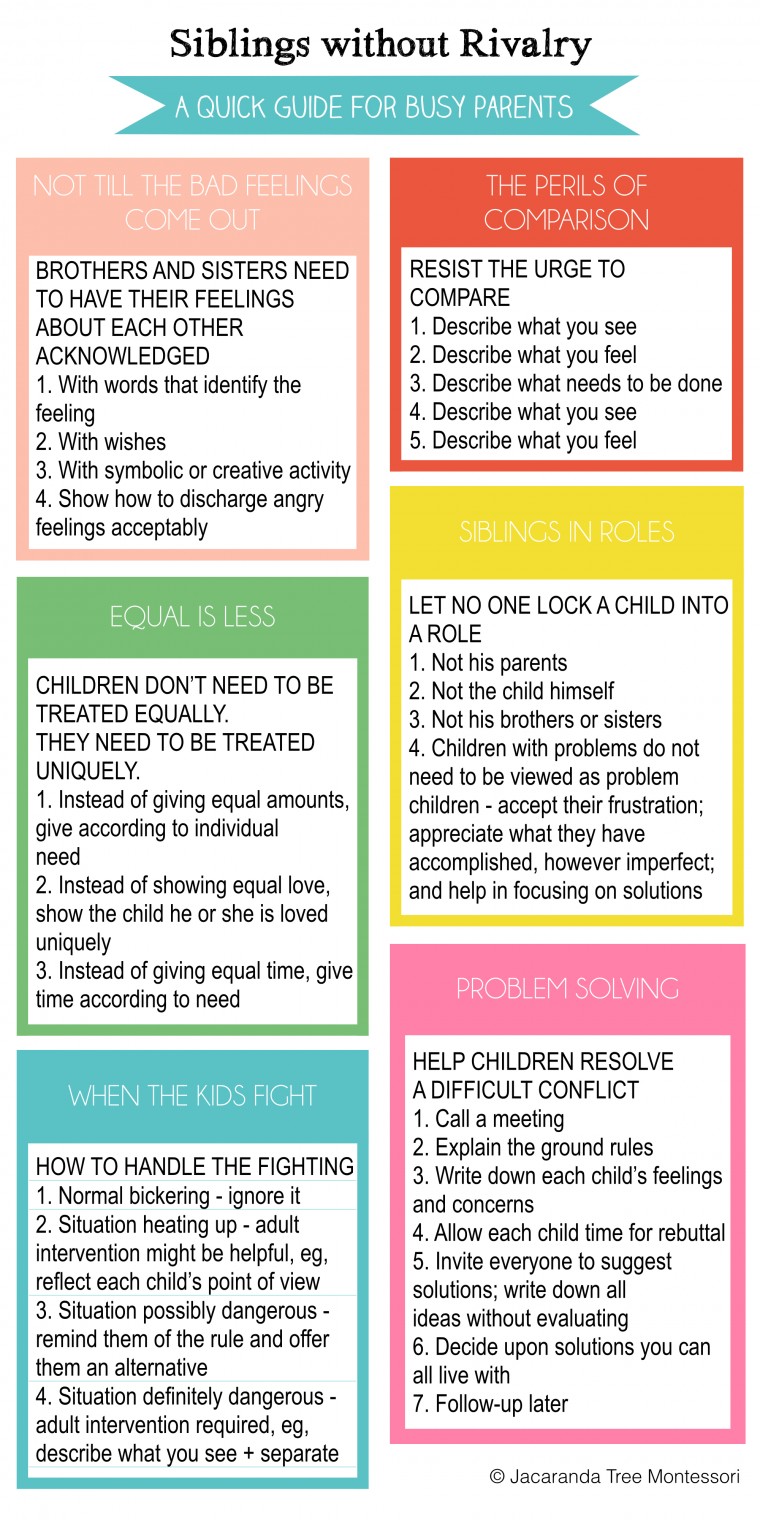
About Simone

Simone Davies loves putting Montessori into practice. She is a qualified 0-3 Montessori teacher through the Association Montessori Internationale (AMI) and mother of two children who attended Montessori preschool and primary school. She is from Australia and lives in the Netherlands where she runs a Montessori playgroup for babies, toddlers and preschoolers in Amsterdam. Visit her website here: www.jacarandatreemontessori.nl/blog.
More Parenting Ideas
It has been wonderful to have Simone with us! The infograph is so helpful and looks great on my refrigerator. Need more ideas on parenting? Try one of my top posts, Stress Free Discipline.
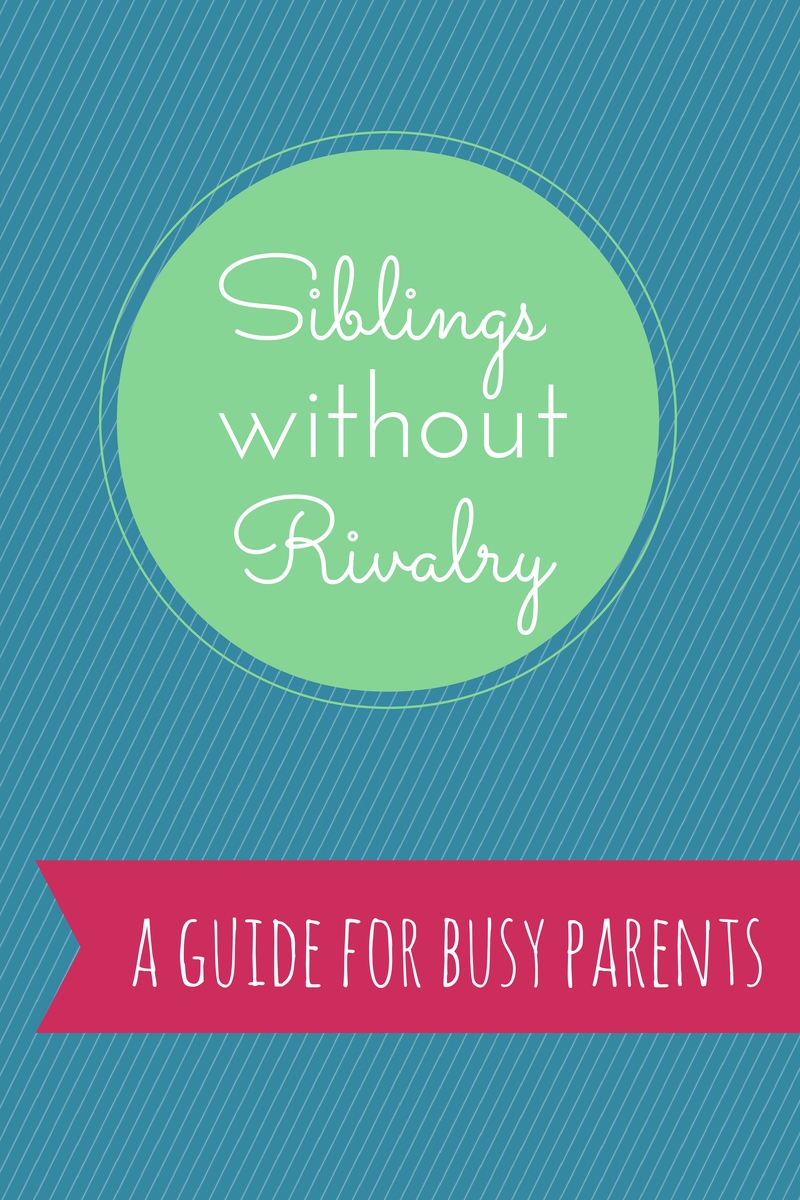

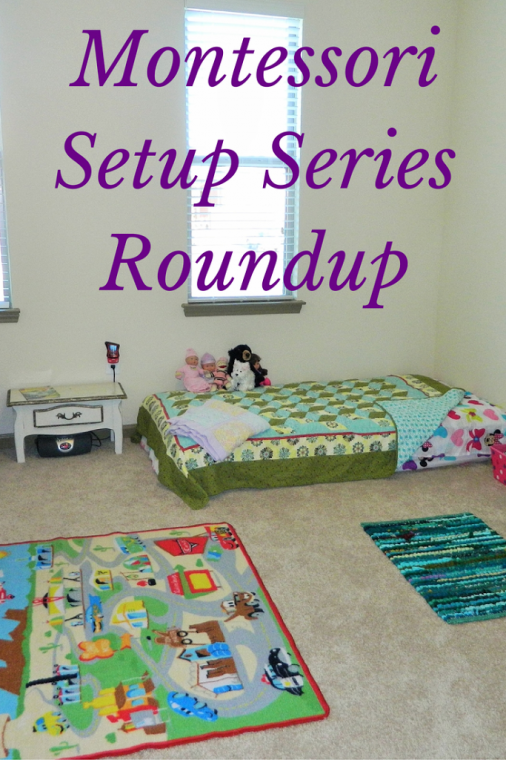
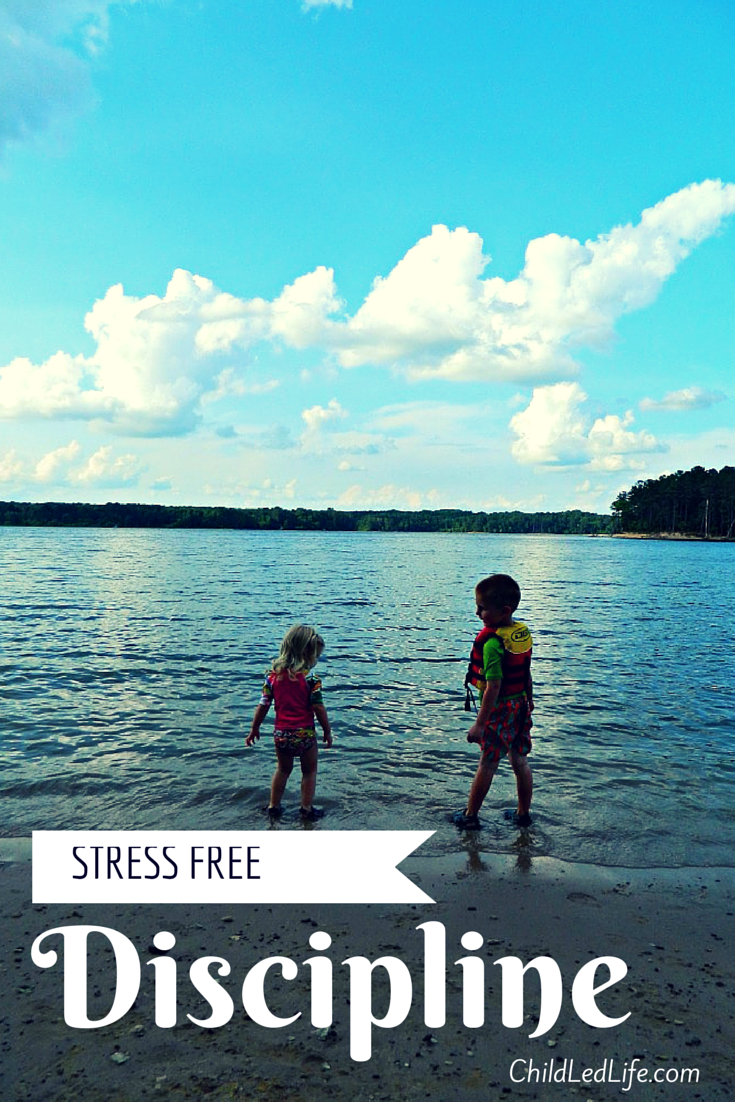
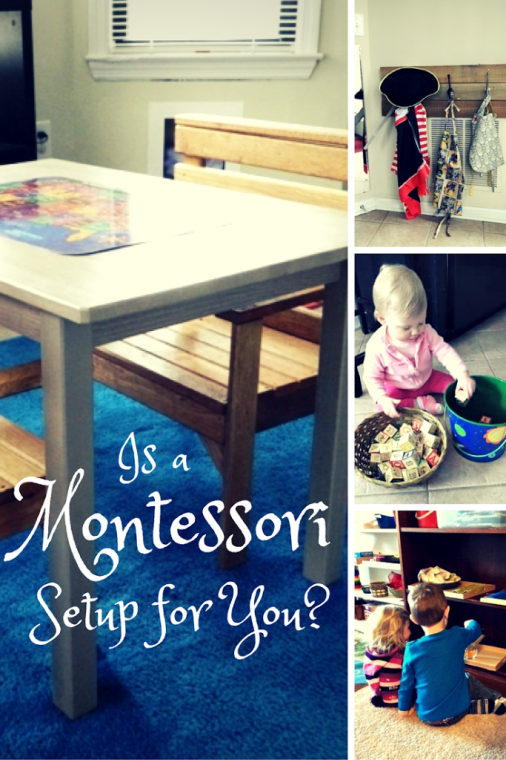
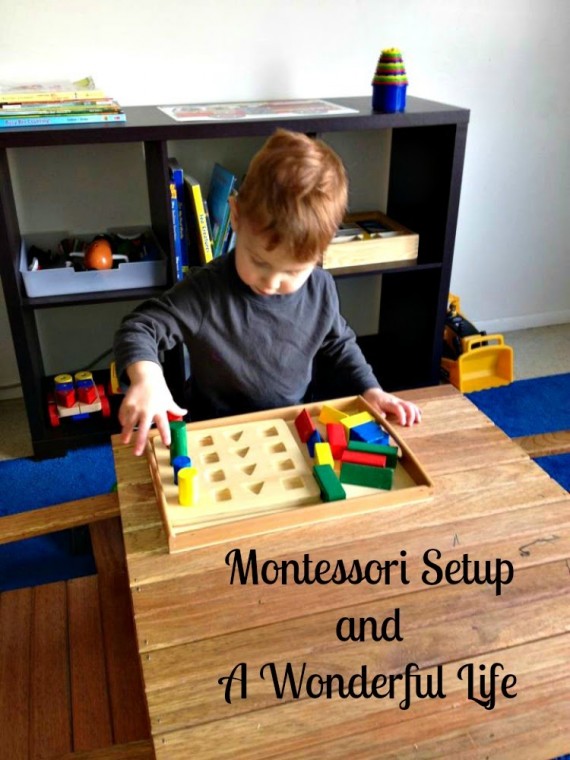
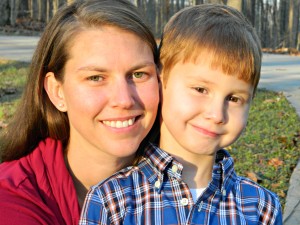
This is great advice – as you know I have girl boy twins so I’ll be printing this information out and sticking it on my fridge as a reminder!
Yes, ma’am. Simone did a beautiful job. I hope you will check out her other post on How to Talk so Kids Will Listen, and Listen so Kids Will Talk. The link is at the top of the post. She is so inspiring to me and so many other readers. We loved having her here with us.
Hi, This is an interesting post and looks like a great resource for families. While I only have one child, the information here is useful for relating to others as well.
Enjoyed reading this. Found your blog on Link and learn link party and started following on Google +.
Erin
http://theeveryday-mom.blogspot.com/
Thank you for stopping by, Erin!
Great advice, I’m often asked about sibling rivalry, so it’d great to have a resource to send parents to. The quick guide is particularly useful. Thanks.
Great! So glad this is a useful resource. Thank you for stopping by, Kellie!
This is a brilliant post. My sister and I always felt we were being compared with each other and neither of us liked it. At home, I felt my dad always compared us and at school, it was my sister who suffered because teachers compared us academically. Our relationship wasn’t that amazing when we were younger, because I always felt misunderstood but we’re the best of friends now and speak to each other every day despite living in different countries x
Thanks for linking up to our #MondayParentingPinItParty and sharing your advice x
Thanks for sharing your post at Motivation Monday. I read Siblings without Rivalry awhile ago. I should pull it out again for a refresher.
This sounds like a great read for parents.
Thank you for stopping by the Thoughtful Spot Weekly Blog Hop this week. We hope to see you drop by our neck of the woods next week!